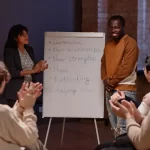In many cases of where neuro linguistic programming is taught, most focus on teaching the
techniques. For instance, you might learn the technique of curing phobias, building confidence and
enhancing good feelings.
I’d like you to consider that NLP is not just about those techniques. Patterns and formats (the
step-by-step process of using a technique) do not necessarily add value to you. You might learn a
technique only to realize that it falls flat on its face when you can’t apply it to certain people.
It happened when I was testing this out while I was still in the university. someone asked me about
“submodalities” and I thought it would be a good way to test submodalities out on this person. It so
happened that the way I used it was a technique I had picked up in NLP 101, and it had no effect on
that person whatsoever. I had attempted to use a technique called the “Swish Pattern”, which was
devised by Richard Bandler several years ago, but it didn’t ‘work’. Or shall I say “I” didn’t work.
You see, I had the mindset that I could treat anything using submodality patterns. However, I
realized later that these are not tailored to suit the client. I did not explore what was going on inside
the mind of the client first, and jumped to the conclusion that the swish technique could work on
him.
This is a common problem with beginners in NLP. The techniques taught are taken to be the gospel
truth, but they are not used properly with effective meta modeling and exploration.
If you want to develop mastery in NLP, you must learn how to apply the principles of NLP at the
foundation level, and develop this foundation well. Once you have this, you can proceed to devise
ANY technique you want, and it will work.
Download our Free e-book and change your life today.








Were you able to find a technique that worked for people that are resistant to submodalities? It makes sense that different people will be affected differently by techniques. I’ve been thinking about learning NLP; where do you suggest to start?